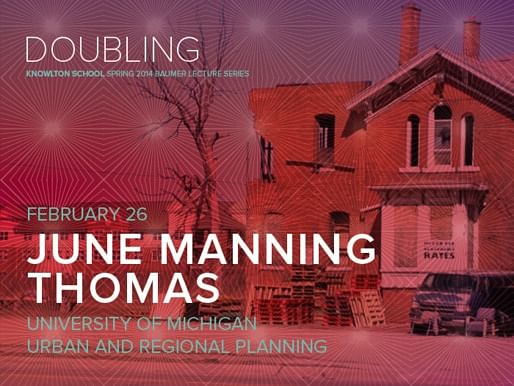

Welcome back everyone. On Wednesday June Manning Thomas came down from “the state up North”, the University of Michigan (we have actually have strong ties there through the Possible Mediums conference among other things). June has researched and written extensively on planning history, social equity, and urban revitalization. Our talk to today, “Equity Planning in a Constrained City”, focused on the role of equity planning and the challenges of executing its ideas in a context of constraint.
In simple terms Equity Planning is about offering choices to those who have the least, creating a more egalitarian society. Began with Paul Davidoff’s theories in the 1960’s, in which he advocated for an idea of pluralism, in which the public is fragmented vs being unanimous. In tandem, he was an activist for desegregation. These ideas began to take form in Cleveland under the leadership of Norman Krumholz and the creation of the 1975 policy plan, which looked to address issues of income, housing, transportation, and community development. One of its important measures was a distributional model of finances, in which city money was dispersed throughout neighborhoods rather than restricted to its source neighborhood. Speaking of plans, to our case study…Detroit.
In 2013 the Detroit Future City plan was developed, outlining the cities new strategic framework and it contains, as I briefly understood it, many of these concepts; a Just City. This concept of a ‘Just City’ however has its difficulties. When Susan Fainstein proposed this idea she tested it through case studies of New York, London, and Amsterdam, cities all-in-all doing well. Distressed cities pose many more difficulties. In particular the financial implications of implementing such plans are steep and the reality of people increasingly leaving distressed cities means less revenue. Unfortunately for Detroit the middle class has not returned, posing the question ‘who will pay?’. There is a need to heed Herbert Gans warning on the 1975 Cleveland Plan to cut back spending, because the flow of people isn’t reversing. Along these lines the city government would have to operate on much lower capacities making it difficult for them to operate and gain traction with the public. She described one early meeting where the plan was presented as being particularly hostile, both because the community wasn’t involved in the plans formation, but mostly because they were concerned about the issues now…street lights out, water mains breaking, etc; important public services that can’t be attended to. This is a prime case of the struggle that could continue.
She proposed that the responsibility of urban planners and the government should still be to give attention to those with the fewest choices, but tempered. There is a need for both pragmatism and activism. As always you can find more on Knowlton’s YouTube channel (http://www.youtube.com/user/knowltonosu) and the school website (http://knowlton.osu.edu/news-and-events/lectures) and if you’re in the area don’t miss this weeks lecture, March 5th, with Herman Hertzberger.
This blog will be a feeder for recent news, events and student work occurring at the Knowlton School at The Ohio State University. Posts will typically center around updates from the school's lecture series, exciting projects from recent student reviews and updates from other school events.



No Comments
Block this user
Are you sure you want to block this user and hide all related comments throughout the site?
Archinect
This is your first comment on Archinect. Your comment will be visible once approved.